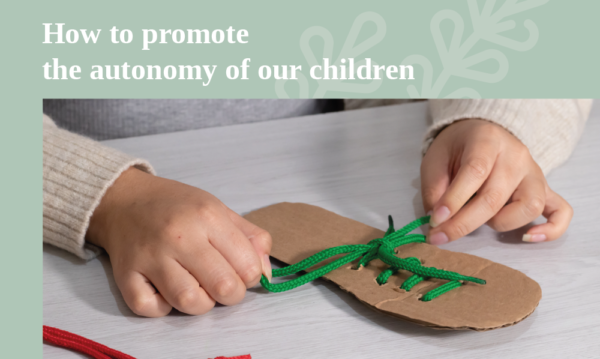Parents must strengthen the child’s independence to gradually become an autonomous entity, which can rely on his strengths.
We will help children acquire an independent personality by giving initiatives and participating actively in solving their problems, thus assimilating important lessons as they learn from their mistakes.
We cannot overlook that people who develop dependency experience helplessness, worthlessness, bitterness, frustration, discomfort, and anger.
Opportunities to promote children’s autonomy are daily and limitless. You can find below some techniques that will encourage the child to rely more on their own than on our strengths.
1. Give the child choices. Providing the child with a variety of options offers invaluable practical resources in the decision-making process. Undoubtedly, it is challenging for an adult, who is called upon to make choices related to his career or personal life, to do so successfully when he has not learned to exercise his critical ability. For the child, every choice, no matter how insignificant, is, therefore, an opportunity to take some control of their lives: “It bothers me when you clap your hands on the table. There are two options: stop and stay in the dining room or keep up the noise in your room. It’s up to you.”
2. Treat the child’s effort with respect. When his effort is appreciated, the child finds the mental reserves to perform the task without help. Statements of the type “You can try, it’s so easy” are not prompts. Because if the child successfully performs the “easy” task, he will feel that he has done nothing extraordinary. If, on the contrary, he fails, he will be left with the bitterness that he has not been able to carry out anything simple. But if we tell him, ‘it’s not easy’ or ‘this is hard,’ we get different messages. If the effort succeeds, the child will feel the satisfaction of achieving a challenging goal. If he fails again, he will be comforted by the thought that the project was difficult to carry out. (“Sometimes it helps to pull the zipper down before you upload it.” )
3. Avoid asking too many questions. That does not mean that you will stop asking your children. It is important to be aware of the potential consequences of the questions asked. Many questions may be perceived as an attempt to invade the other person’s “personal space.” The child will speak when he deems it appropriate and will say what he wants to say.
4. Do not rush to give answers. When children ask questions, they should have the opportunity to find the answer independently. “What is a rainbow?”, “Do I have to go to university?” Parents often feel confused by having to answer similar questions and seek immediate appropriate answers. It is particularly beneficial to “return” the questions to them: “Interesting question, what do you think?”
5. Encourage the use of external sources. We need to make children feel that they do not depend solely on us. The outside world can sometimes provide a solution to their problem. It has been found that external sources will weigh much more than the word of mom and dad.
6. Don’t lose hope. Instead of preparing the children for frustration, let them test their strengths and gain experiences. The continuous protection of children from disappointment, at the same time, results in the “tearing down” of dreams and expectations, the reduction of effort, and, sometimes, the non-realization of goals.
Different ways to promote autonomy:
1. Let the child define his body. You do not need to continually button his jacket, take off his shoes, shake the dust off his clothes. Children usually treat such interventions as “invasion” of their physical territory.
2. Don’t get involved in the small details of his life. Children are incredibly annoyed when they hear phrases like this “Snap your pants… What a stupid way to spend your money? Why are you writing with your nose stuck to the paper? etc.”
3. Do not comment on the child in front of him – no matter how young he is: “In the first grade my little was upset because he did not do well in writing.”, “Don’t pay attention to her. She’s a little shy.” When children listen to adults refer to them in such a way, they feel like they are “the property” of their parents.
4. Let the child answer questions concerning him. The parent has to answer questions such as “Does Paul like school?”, “How is he doing with the baby?”. The best sign of respect for the child’s autonomy is to give the person who asks the following answer: “Ask Paul. He knows best.”
5. Wait for time to pass. Sometimes the child desires something very much but is not psychologically or physically ready to realize his desire. Instead of pushing or blackmailing situations and putting the child in a difficult position, let us express the certainty that the conditions will mature. If, for example, little Elizabeth wants to go swimming with the other children but is afraid of the sea, you can answer like this: “I am not worried. When you feel ready, you’ll swim.”
6. Avoid immediately saying “No.” Some children perceive denial as a “declaration of war” as a deprivation of their autonomy. They use all their forces to “counterattack” by answering: “Why not?”, “You are evil!”, “I hate you!”
Alternatives to denial solutions:
A. Provide information (avoiding the use of “no”).
Child: Can I go to Helen now and play?
Parent: We are going to eat in five minutes.
After this information, the child may think it is not the right time to go to his girlfriend.
B. Acceptance of emotions.
Kid (in the park): I don’t want to go home. Can’t we stay any longer?
Parent: I see that if it were up to you, you’d stay a long time. (Hold the child by the hand) It’s hard to leave a place you like so much.
Often, our resistances decrease when others understand how we feel.
C. Describe the problem.
Child: Mom, can you take me to the park now?
Parent: I’d like to take you now, but the problem is I’m waiting for the plumber to be here in half an hour.
D. If possible, replace denial with an affirmation.
Child: Can we go to the playground?
Parent: Yes, of course! Right after dinner!
Q. Give yourself time to think.
Child: Can I sleep tonight at Mark’s house?
Parent: Let me think about it.
This answer defuses the child’s tension and allows the parent to elaborate on the child’s request.
References:
Faber, A., Mazlish, E., (1999). How to talk so kids will listen and listen so kids will talk, Collins


